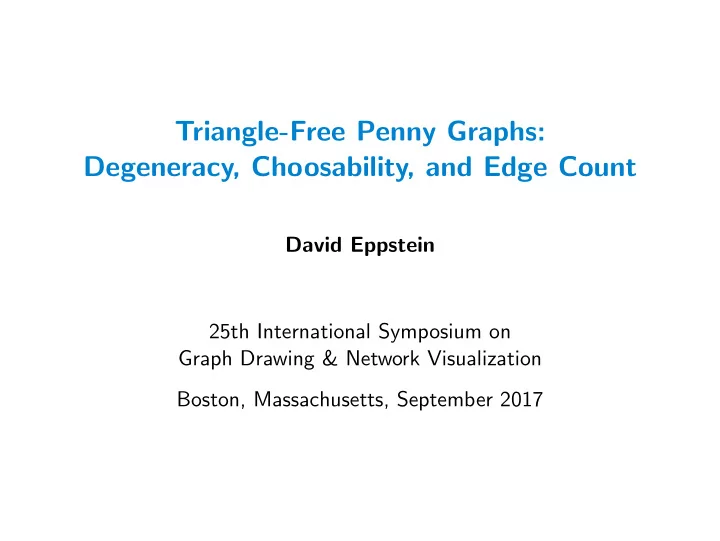

Triangle-Free Penny Graphs: Degeneracy, Choosability, and Edge Count David Eppstein 25th International Symposium on Graph Drawing & Network Visualization Boston, Massachusetts, September 2017
Circle packing theorem Contacts of interior-disjoint disks in the plane form a planar graph All planar graphs can be represented this way Unique (up to M¨ obius) for triangulated graphs [Koebe 1936; Andreev 1970; Thurston 2002]
Balanced circle packing Some planar graphs may require exponentially-different radii a c b d But polynomial radii are g e f j h i k possible for: m n o l ◮ Trees p ◮ Outerpaths ◮ Cactus graphs a ◮ Bounded tree-depth b d c [Alam et al. 2015] h i j e g f k m l n o p
Perfect balance Circle packings with all radii equal represent penny graphs [Harborth 1974; Erd˝ os 1987]
Penny graphs as proximity graphs Given any finite set of points in the plane Draw an edge between each closest pair of points (Pennies: circles centered at the given points with radius = half the minimum distance) So penny graphs may also be called closest-pair graphs or minimum-distance graphs
Penny graphs as optimal graph drawings Penny graphs are exactly graphs that can be drawn ◮ With no crossings ◮ All edges equal length ◮ Angular resolution ≥ π/ 3
Properties of penny graphs 3-degenerate (convex hull vertices have degree ≤ 3) ⇒ easy proof of 4-color theorem; 4-list-colorable [Hartsfield and Ringel 2003] Number of edges at most 3 n − √ 12 n − 3 Maximized by packing into a hexagon [Harborth 1974; Kupitz 1994] NP-hard to recognize, even for trees [Bowen et al. 2015]
Triangle-free penny graphs Planar equal-edge-length graphs with angular resolution > π/ 3 Conjecture [Swanepoel 2009] : max # edges is ⌊ 2 n − 2 √ n ⌋ , given by (partial) square grid Only known results were inherited from ∆-free planar graphs: ◮ # edges ≤ 2 n − 4 ◮ 3-colorable [Gr¨ otzsch 1959]
New results 2-degenerate (if not tree has ≥ 4 degree-2 vertices) ⇒ 3-list-colorable 2 2 2 2 2 2 # edges ≤ 2 n − Ω( √ n )
Proof that some vertices have ≤ 2 neighbors At each vertex on outer face, draw a ray directly away from neighbor counterclockwise from its clockwise-boundary neighbor If we walk around boundary, rays rotate by 2 π in same direction But they only rotate positively at vertices of degree ≤ 2!
Proof that # edges ≤ 2 n − Ω( √ n ) Isoperimetric theorem: To enclose area of n pennies, outer face must have Ω( √ n ) edges + Algebra with face lengths and Euler’s formula
Conclusions and future work We proved degeneracy and edge bounds for ∆-free penny graphs The same results hold for squaregraphs [Bandelt et al. 2010] but arbitrary ∆-free planar graphs can be 3-degenerate or (even when 2-degenerate) have 2 n − 4 edges Still open: The right constant factor in the √ n term
References I Md. Jawaherul Alam, David Eppstein, Michael Kaufmann, Stephen G. Kobourov, Sergey Pupyrev, Andr´ e Schulz, and Torsten Ueckerdt. Contact graphs of circular arcs. In Frank Dehne, J¨ org-R¨ udiger Sack, and Ulrike Stege, editors, Algorithms and Data Structures: 14th International Symposium, WADS 2015, Victoria, BC, Canada, August 5-7, 2015, Proceedings , volume 9214 of Lecture Notes in Computer Science , pages 1–13. Springer, 2015. doi: 10.1007/978-3-319-21840-3 1 . E. M. Andreev. Convex polyhedra in Lobaˇ cevski˘ ı spaces. Mat. Sb. (N.S.) , 81(123):445–478, 1970. Hans-J¨ urgen Bandelt, Victor Chepoi, and David Eppstein. Combinatorics and geometry of finite and infinite squaregraphs. SIAM J. Discrete Math. , 24(4):1399–1440, 2010. doi: 10.1137/090760301 .
References II Clinton Bowen, Stephane Durocher, Maarten L¨ offler, Anika Rounds, Andr´ e Schulz, and Csaba D. T´ oth. Realization of simply connected polygonal linkages and recognition of unit disk contact trees. In Emilio Di Giacomo and Anna Lubiw, editors, Graph Drawing and Network Visualization: 23rd International Symposium, GD 2015, Los Angeles, CA, USA, September 24–26, 2015, Revised Selected Papers , volume 9411 of Lecture Notes in Computer Science , pages 447–459. Springer, 2015. doi: 10.1007/978-3-319-27261-0 37 . P. Erd˝ os. Some combinatorial and metric problems in geometry. In Intuitive geometry (Si´ ofok, 1985) , volume 48 of Colloq. Math. Soc. J´ anos Bolyai , pages 167–177. North-Holland, 1987. URL https://www.renyi.hu/~p_erdos/1987-27.pdf . Herbert Gr¨ otzsch. Zur Theorie der diskreten Gebilde, VII: Ein Dreifarbensatz f¨ ur dreikreisfreie Netze auf der Kugel. Wiss. Z. Martin-Luther-U., Halle-Wittenberg, Math.-Nat. Reihe , 8:109–120, 1959. H. Harborth. L¨ osung zu Problem 664A. Elemente der Mathematik , 29: 14–15, 1974.
References III Nora Hartsfield and Gerhard Ringel. Problem 8.4.8. In Pearls in Graph Theory: A Comprehensive Introduction , Dover Books on Mathematics, pages 177–178. Courier Corporation, 2003. Paul Koebe. Kontaktprobleme der Konformen Abbildung. Ber. S¨ achs. Akad. Wiss. Leipzig, Math.-Phys. Kl. , 88:141–164, 1936. Y. S. Kupitz. On the maximal number of appearances of the minimal distance among n points in the plane. In K. B¨ or¨ oczky and G. Fejes T´ oth, editors, Intuitive Geometry: Papers from the Third International Conference held in Szeged, September 2–7, 1991 , volume 63 of Colloq. Math. Soc. J´ anos Bolyai , pages 217–244. North-Holland, 1994. Konrad J. Swanepoel. Triangle-free minimum distance graphs in the plane. Geombinatorics , 19(1):28–30, 2009. URL http: //personal.lse.ac.uk/SWANEPOE/swanepoel-min-dist.pdf . William P. Thurston. Geometry and Topology of Three-Manifolds . Mathematical Sciences Research Inst., 2002.
Recommend
More recommend